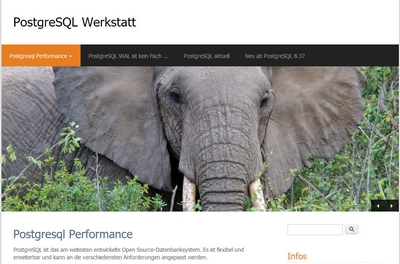Neues vom PostgreSQL Planet
Vibhor Kumar: pg_background: make Postgres do the long work (while your session stays light)
There’s a special kind of joy in watching a database do something heavy… without making your app threads cry.
That’s the promise of pg_background: execute SQL asynchronously in background worker processes inside PostgreSQL, so your client session can move on—while the work runs in its own transaction.
It’s a deceptively simple superpower:
Lætitia AVROT: The MCD: Your Rosetta Stone for Turning "We Need a Database" into Actual Requirements
Vibhor Kumar: Autonomous Postgres: From Speed to Trust
Over the last few years, one idea has been quietly taking shape in the Postgres world:
Autonomy in Postgres isn’t a feature.
It’s a posture.
It’s not a checkbox you tick in a product matrix.
It’s not a single “autonomous mode” toggle in a control panel.
Cornelia Biacsics: Contributions for week 6, 2026
FOSSASIA PGDay 2026 talk selection committee met to finalize the schedule
Call for Paper Committee - Members:
- Tatsuo Ishii
- Amit Kapila
- Amit Langote
Seattle Meetup took place on January 12 2026, organized by Lloyd Albin and Jeremy Schneider. Claire Giordano delivered a talk there.
Jeremy Schneider: The Scott Shambaugh Situation Clarifies How Dumb We Are Acting
My personal blog here is dedicated to tech geek material, mostly about databases like postgres. I don’t get political, but at the moment I’m so irritated that I’m making the extraordinary exception to veer into the territory of flame-war opinionating…
Michael Christofides: Read efficiency issues in Postgres queries
A lot of the time in database land, our queries are I/O constrained. As such, performance work often involves reducing the number of page reads. Indexes are a prime example, but they don’t solve every issue (a couple of which we’ll now explore).
Goutham Reddy: Row-level and Column-level Security - Oracle vs PostgreSQL
Ming Ying: How We Optimized Top K in Postgres
Ryan Booz: Introducing Bluebox Docker: A Living PostgreSQL Sample Database
Vik Fearing: pgDay Paris 2026 - EARLYBIRD ending soon!
Only ONE WEEK LEFT for the earlybird tickets. Make sure you get yours before it's too late!
https://2026.pgday.paris/registration/
Gilles Darold: PostgreSQL v19: Password expiration warnings.
Luca Ferrari: Introducing mnemosyne systems
A new entity in the PostgreSQL landscape.
Introducing mnemosyne systemsThe last week a new entity appeared in the PostgreSQL landscape: **mnemosyne systems **, the last creation of Jesper Pedersen.
The initial page says it all:
Shane Borden: Do PostgreSQL Sub-Transactions Hurt Performance?
The short answer is always “maybe”. However, in the following post, I hope to demonstrate what creates a sub-transactions and what happens to the overall transaction id utilization when they are invoked. I will also show how performance is affected when there are lots of connections creating and consuming sub-transactions.
First, it is important to understand what statements will utilize a transaction id and which ones may be more critical (expensive) than others:
ahmed gouda: Monitoring query plans with pgwatch and pg_stat_plans
The PostgreSQL ecosystem just introduced a new pg_stat_plans extension. It's similar to pg_stat_statements but it tracks aggregated statistics for query plans instead of SQL statements.
Dave Page: Teaching an LLM What It Doesn't Know About PostgreSQL
Large language models know a remarkable amount about PostgreSQL. They can write SQL, explain query plans, and discuss the finer points of MVCC with genuine competence. But there are hard limits to what any model can know, and when you're building tools that connect LLMs to real databases, those limits become apparent surprisingly quickly.The core issue is training data. Models learn from whatever was available at the time they were trained, and that corpus is frozen the moment training ends.
Lætitia AVROT: PAX: The Cache Performance You're Looking For
Regina Obe: PostGIS Patch Releases
The PostGIS development team is pleased to provide bug fix releases for PostGIS 3.0 - 3.6. These are the End-Of-Life (EOL) releases for PostGIS 3.0.12 and 3.1.13. If you haven’t already upgraded from 3.0 or 3.1 series, you should do so soon.
Cornelia Biacsics: Contributions for week 5, 2026
PGBLR Meetup met on February 7, organized by Organizers Amit Kapila, Kuntal Ghosh, Sivji Kumar Jha and Vigneshwaran C.
Speaker:
- Shreya R. Aithal
- Suresh
- Y V Ravi Kumar
Mumbai PostgreSQL UserGroup met on February 7 - organized by Ajit Gadge, Sovenath Shaw and Deepak Mahto
Speaker:
Jan Kristof Nidzwetzki: eBPF Tracing of PostgreSQL Spinlocks
PostgreSQL uses a process-based architecture where each connection is handled by a separate process. Some data structures are shared between these processes, for example, the shared buffer cache or the write-ahead log (WAL). To coordinate access to these shared resources, PostgreSQL uses several locking mechanisms, including spinlocks. Spinlocks are intended for very short-term protection of shared structures: rather than immediately putting a waiting process to sleep, they busy-wait and repeatedly check whether the lock is free.

